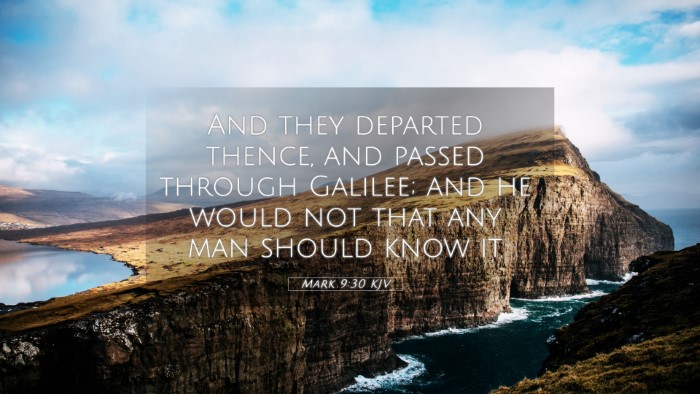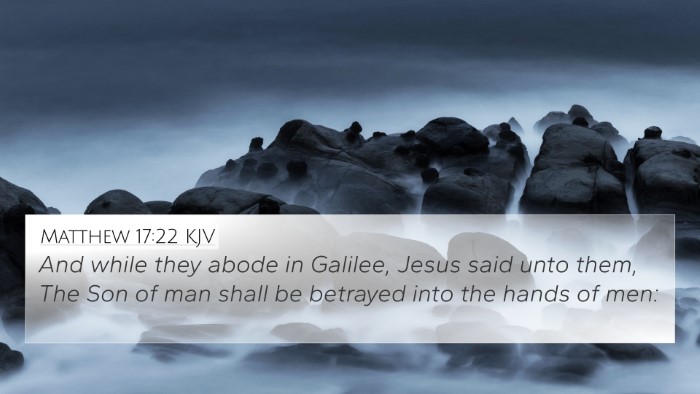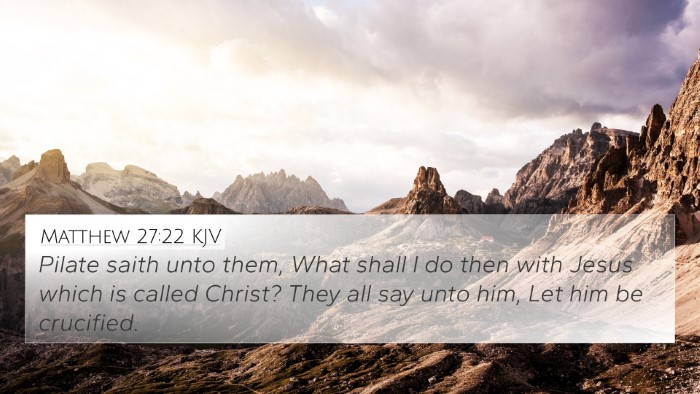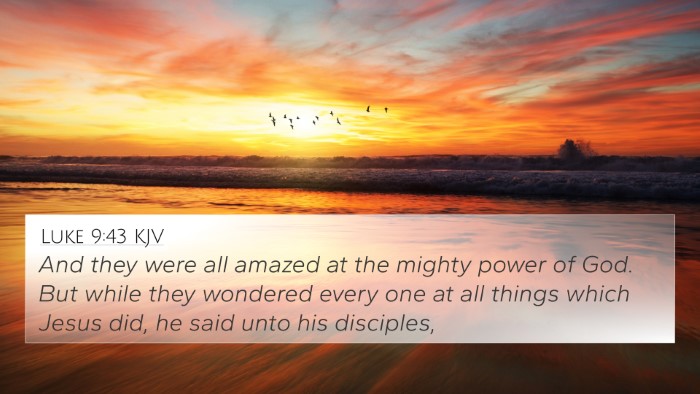Understanding Mark 9:30
Verse Reference: Mark 9:30 states: “And they departed thence, and passed through Galilee; and he would not that any man should know it.”
Summary of Meaning
The passage captures a poignant moment in Jesus' ministry during His journey through Galilee with His disciples. This is one of several instances where Jesus seeks privacy, indicating both the increasing attention He is receiving and the significance of His impending suffering. The verse highlights themes of secrecy, the preparation for His ultimate sacrifice, and the disciples' understanding of Jesus' mission and fate.
Commentary Insights
- Matthew Henry: Henry emphasizes the motives behind Jesus' actions, suggesting that He sought to instruct His disciples away from the public eye, allowing them to reflect on the gravity of His mission without distraction. This was a time for deep teaching regarding His impending death and resurrection.
- Albert Barnes: Barnes notes that the choice to avoid public notice was a strategic move by Jesus to focus on the disciples' spiritual development. The absence of public pressure allowed for intimate discussions about the kingdom of God and the nature of His Messiahship.
- Adam Clarke: Clarke discusses the deeper implications of this verse, pointing out the divine timing in Jesus' ministry. He interprets this season of retreat as a necessary preparation for the significant events that would soon unfold leading to the crucifixion.
Thematic Connections
This verse suggests several themes that are prevalent throughout the Bible:
- Secrecy and Revelation: The secrecy that Jesus maintained about His identity and mission connects with other verses where He instructs demons and healed individuals to remain silent about His works (e.g., Mark 1:25, Matthew 12:16).
- Preparation for Sacrifice: Jesus’ focus on teaching and preparing His disciples for His impending sacrifice relates to other prophetic insights like Isaiah 53 and the Synoptic accounts of the Last Supper (e.g., Luke 22:19-20).
- Discipleship: The theme of discipleship is reinforced, where the need for understanding the cost of following Jesus mirrors similar discussions in Luke 9:23-24 about taking up one’s cross.
- Divine Mission: Jesus’ mission, emphasizing teaching, healing, and ultimately, sacrifice, links to scriptures detailing His purpose (John 3:16-17).
- Isolation for Reflection: The motif of withdrawal for reflection, like in Mark 6:31, reinforces the importance of solitude in understanding divine truths.
- Public Perception: Jesus’ relationship with the crowds and their seeking Him can be contrasted with His more intimate moments with His disciples, seen in Matthew 8:20.
Cross References
This verse has several pivotal Bible verse cross-references which deepen its understanding:
- Matthew 16:21 - Jesus predicts His suffering, death, and resurrection.
- Luke 9:22 - Similar prediction of His fate in the context of His mission.
- Mark 8:31 - Jesus begins to teach openly about His suffering.
- Matthew 17:22-23 - Foretelling His betrayal and resurrection to the disciples.
- John 2:23-25 - Mentioning Jesus’ knowledge of human hearts and His restraint from public accolades.
- John 7:1 - Jesus stayed in Galilee to avoid the pressure from Judean authorities.
- Matthew 14:13 - Withdrawal of Jesus, seeking solitude after hearing of John the Baptist's death.
Exploring Connections Between Bible Verses
Through cross-referencing Biblical texts, we can see thematic and doctrinal relationships that enhance understanding. For example:
- Comparative Bible Verse Analysis: The analysis of Mark 9:30 with parallel accounts in Matthew and Luke showcases different lenses through which Jesus’ mission is presented.
- Identifying Connections: Observing how Old Testament prophetic texts foreshadow New Testament revelations regarding sacrifice and suffering.
- Cross-referencing Psalms: Relating themes of suffering in Mark to passages in Psalms, such as Psalm 22, which mirror Jesus' anguish.
Conclusion
Mark 9:30 serves as a crucial waypoint in the story of Jesus, inviting deeper exploration of His mission and the transformation of His disciples. By engaging with tools for Bible cross-referencing, readers can enrich their understanding of how scripture dialogues with itself, revealing the coherence of the Christian narrative.






